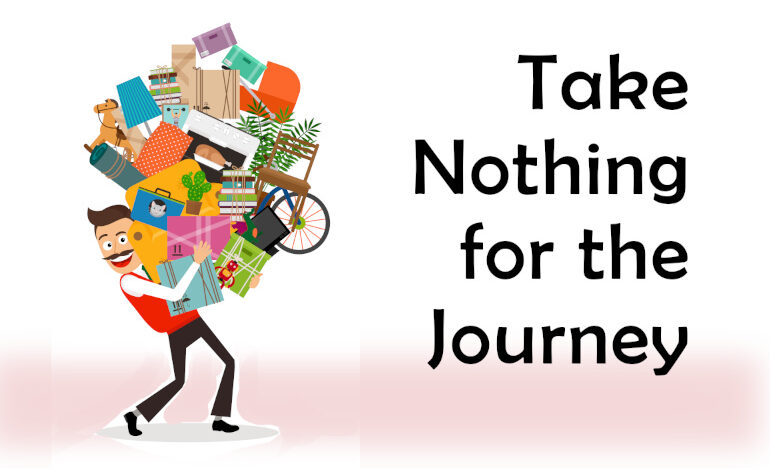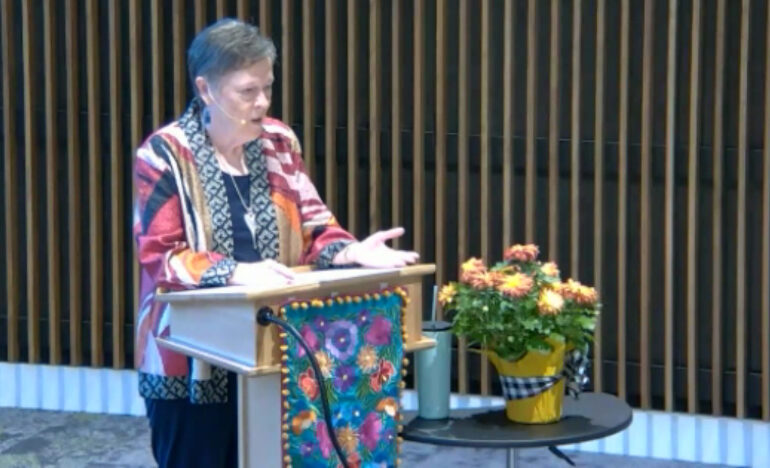Take Nothing for the Journey

An Assembling God’s Puzzle video
By Fr. Garry Richmeier, C.PP.S.
When Jesus sent his apostles out to preach the Good News, he told them to take nothing for the journey — no walking stick, no sack, no sandals, no money. He also told them not to plan for a place to stay or for food to eat. Instead, simply rely on whoever is generous enough in each town to supply their needs.
To us as a success-oriented, practical, organized, plan-ahead, independent-minded culture, this may not sound like good advice. But I think Jesus was making a very important statement about what works, or doesn’t work, in our dealings with each other. He was saying that to really proclaim the Good News of God’s love, we need to let go of some things that could get in the way, and simply rely on the message.
Letting go of things, also known as emptying, is necessary if we are to successfully fit together all of life’s puzzle pieces.
My experience as a counselor has taught me this. Over the years I’ve learned what works (what is helpful to people) and what doesn’t. Trial and error has usually done the teaching.
I’ve learned that when a person comes to me in counseling, I have to let go of my preconceived notions of who they are and what they are going through. I have to let go of any attempt to give an answer or to try and solve their problem with advice. I have to let go of any comparison of the person with myself or with any other person. I have to let go of my instinctual like or dislike of the person. I have to let go of any judgment about them at all.
As I begin the journey of developing a counseling relationship with someone, I need to let go of all these things and heed the words of Jesus to take nothing for the journey. This allows me to truly hear who the person is without all my “stuff” getting in the way or clouding my understanding of the person.
I have to trust that this will effectively communicate the “Good News” that the person is important, reverenced, and cared about. And that it will be that Good News, more than anything else, that will help the person along the path of healing and growth. Without that, all my counseling skill and knowledge of psychology will do no good.
The trouble is that we humans often really don’t trust that simply caring about a person (listening to them, respecting their views and situation, understanding their struggles, etc.) will make a difference. We don’t think that is enough, so we bring in our “stuff” in order to make something happen.
So we bring in our experiences and advice as the answer for the person. Or we tell the person about our religion and moral code that they should follow. Or we use threats or shame to get them to change. Or we use our resources to do the work for them since we see them as incapable. Or we simply abandon the person because of our belief they are stubborn or unwilling to change.
Some of our “stuff” can be helpful to another person after a relationship of trust is established, but not before. Besides, it is my experience that people have what they need, to do what they need to do, if they believe they are valuable and worthwhile.
In counseling I often find that, after building a relationship of trust, clients can tell me what they can do to improve their situation. I don’t have to tell them, or give them anything of mine.
Our polarized society is a perfect example of what happens when all we do is put our own “stuff” out there (our own philosophy, economic strategy, opinions, moral code, political platform, etc.) without communicating to others that they and their views are valued. We end up with each side feeling de-valued by the other side, which creates hurt and anger, which prompts each side to dig in its heels and insist even more vocally that it is right and the other is wrong.
Jesus’ teaching is very counterintuitive, which is why we have trouble believing in it. We just don’t believe that simple caring about another will get done what we think should get done, so we turn to our own strategies, our own ideas, our own stuff.
It is possible to practice letting go of our own stuff and get better at it. One way is to spend time each day in prayer or meditation, reflecting on how most of our best laid plans in the past didn’t go exactly the way we designed them. And yet, somehow God got us to this point. Our “stuff” wasn’t the deciding factor — God’s “stuff” was. That is one practice that might help us trust God’s plan a little more, enabling us to better put our stuff aside when needed.
Take nothing for the journey, and you will get to where you need to be. Can we trust that much?
All of the videos in this series can be found here: Assembly God’s Puzzle.
Never miss an article published on the Renewal Center website: Sign up to receive our newsletters.
[Fr. Garry Richmeier, a Precious Blood priest and spiritual director, holds a Master’s of Divinity Degree from St John’s University in Collegeville, Minnesota, and a Master’s of Counseling Psychology degree from the University of Missouri-Kansas City. He is a licensed professional counselor and a licensed marriage and family therapist.]
Ilustration ID 63106645 © Ssstocker | Dreamstime.com — Take Nothing for the Journey — An Assembling God’s Puzzle video
We’d Like to Hear from You!
We’d like to know what you think about this article. Send us a comment using the form below. Do you have a suggestion? Is there something you want to learn more about? Send us a note.
Related

Discover Lectio Divina
Presented by Kathy Keary
This is a recording of “Discover Lectio Divina” presented by Kathy Keary at Precious Blood Renewal Center in Liberty, Missouri, on Oct. 2, 2025.

Do You Hear What I Hear?
By Fr. Garry Richmeier, C.PP.S.
How can we avoid the harmful affects of the polarization that characterizes so much of our lives these days? One step toward this end is to cultivate a greater understanding and appreciation for the idea of relativity in human behavior.
Categories
Assembling God's Puzzle Coffee with Padre Cooking & Spirituality Encounters of the 4th Kind Family Matters Guided Meditations Reflections on the Eucharsitic Prayers Spiritual Resources Taize Prayers Teach Us to Pray The Contemplative Life Traveling with Pilgrims of Hope Uncategorized Videos Week of Prayer for Christian Unity When you need a little help
